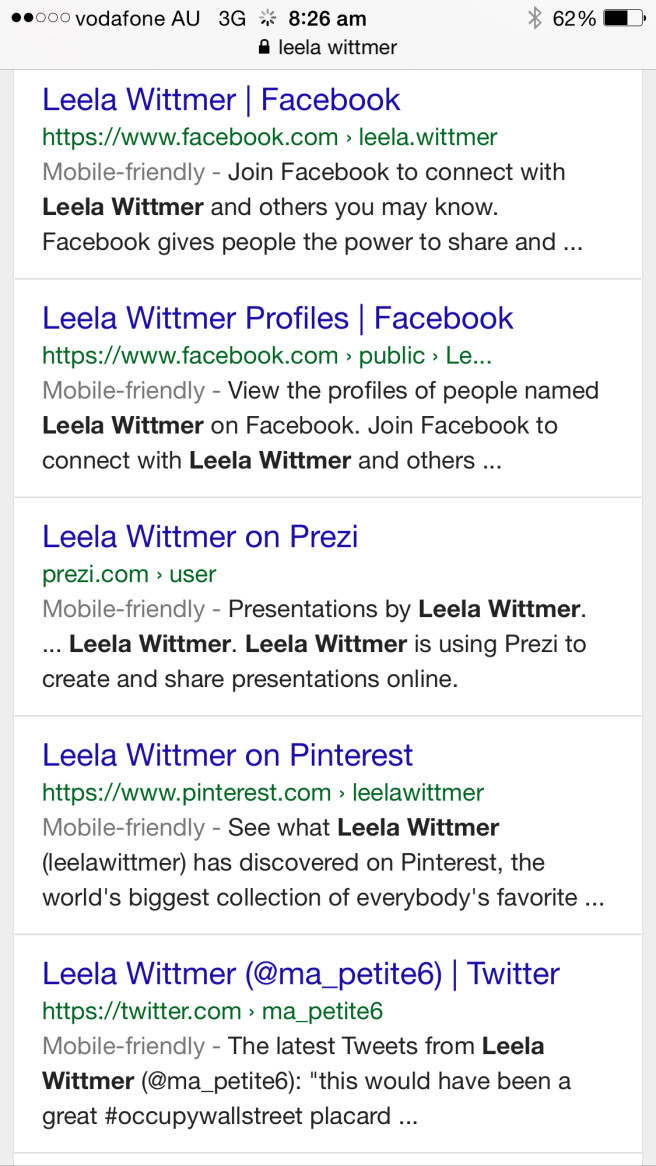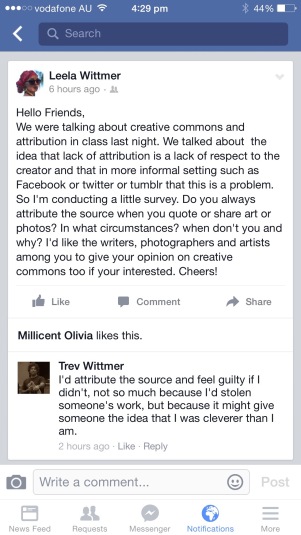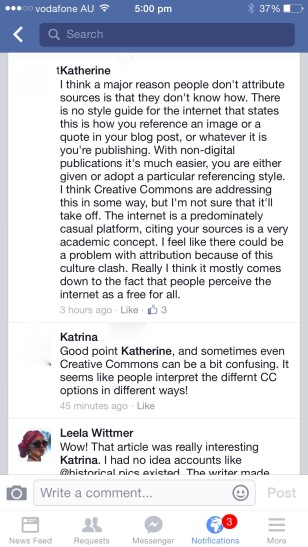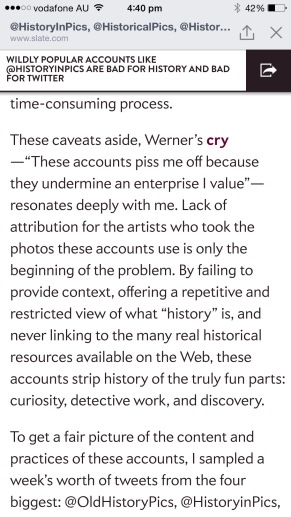There has been a lot said about this course throughout the semester and a lot that could still be said. Wow. This is sounding like a eulogy. Anyway, because I’m not sure where to start I’m going to work through the list of talking points and address them in this here post. This is also an attempt to reduce rambling (I make no promises! I did create a 20 minute long reflection video without realising at the start of semester). So here goes:
Hmm week one… Well we didn’t have class that week so I probably didn’t think about or expect to much from this class. Not a helpful comment sure but I’m making a point: I waltzed into this course (as in the entire masters) after enrolling two weeks before semester started. I hadn’t read any course outlines, I wasn’t familiar with the language and therefor had very little expectations. The little I gleaned from each of my courses before attending was from the names. So with ’emerging tech’ I thought it would be the subject I would struggle most with both in terms of relating to it and how well I could do academically. Turns out I was wrong on both counts. I found this course interesting and engaging and the content well within my grasp… as long as I was keeping up with the workshops and checking both the external site and the google plus community. So I had few difficulties with the content but (as will the whole course) have struggled with the amount and extent of the online engagement. I’m not someone who likes to engage everyday. I don’t always pick up my phone just before sleep and just as I wake up and scroll though Facebook (which by the way are some of the highest site traffic times for social media and news sites). So not having that engagement as part of my day to day habit I ended up missing things or forgetting to check in on the community or spending all of my allowed study time catching up on the various sites we have been asked to participate in. When I was finally engaging to the appropriate level, I found it hard to maintain and exhausting; like a 13 week dinner party. This isn’t a complaint I’m registering with the course, merely something that I found difficult to adjust to. I know that in emerging tech the guidelines say the minimum posting is twice a fortnight which is by no means onerous but I still felt the pressure. I wasn’t all bad. I found that when I was engaging with the google+ community regularly I really enjoyed it and the learning experience was valuable.
I was stimulated and learned something from every weeks topic. In openness I learned about open education and even more about creative commons and copyright. I learned that not everyone is as enthusiastic about open access information and knowledge as I am. Not what I expected. Some people don’t like the idea! SHOCK! HORROR! I found the various perspectives in class both challenging and enlightening. It was a great syncronicitous week because we were talking about what makes information quality in another class and the perspectives I heard became even more varied. It surprised me to learn that people were as vehemently sure that knowledge of a certain type has more value and to keep it that way it needs a price point as I was in the opposite direction. All knowledge has value, it just depends on the context.
Gamification was both the most interesting and the most challenging topic. I found the activity stimulating and people’s fierce competitiveness and anxieties about getting it right fascinating; partly because I was unfamiliar with it. Learning about serious games gave me hope and fear in equal measure. Hope because gamification signifies people dedicating thought and passion to a cause. Fear because the serious games we talked about had no depth. Hunger is not solved by rice or even money. Serious social issues that need solving do not have simple solutions, they are deep and complex and often have ramifications and connections that reach into many strata of society. People’s competitiveness surprised me: I had no interested in accumulating points bar the need to qualify for playing (why I’ll never play organised sports) but my classmates were fierce! Especially when the story came along and there was a possibility of another persons ‘wrong’ activity would affect their points. The gamification activity was challenging as well because if I wasn’t involved in the community constantly I got fear-of-missing-out anxiety. I didn’t even really make a conscious choice about playing. I checked in as the story was getting started and wanted to be play. I hadn’t even read that weeks blog posts yet.
I really enjoyed this unit, the varied means of assessment, the class interaction, the content, which had surprising connection with social justice, and even the technology. It was way outside my comfort zone but I like that about studying. I would never have come across any of the technologies we used or discussed without this course and its forced me to look at my limitations especially considering my newly chosen career path.
This unit has made me realise how easy it is to pigeon-hole oneself and as a result stunt learning. I have alway thought of myself as competent on the internet in its various 2.0-ness but any further into the realm of technology I was out of my depth. I think this is limiting. I did the same thing with the entire course. I told myself that the IT stuff was out of my depth but the library stuff would be fine. It demonstrates to me a total ignorance, on my part, of the modern world of libraries and information sciences. There isn’t really a distinction between the disciplines: not a straight line down the middle anyway. So I learned to keep an open mind and be prepared… and read the course outlines before week one.























